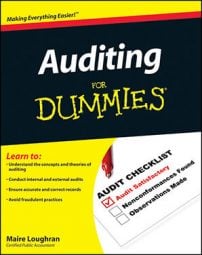Some auditing clients don’t follow Generally Accepted Accounting Principles (GAAP). Some companies — usually smaller, private ones — may use a cash or tax basis instead. Companies that are highly regulated by the local, state, or federal government may need to use a basis required by the regulatory agency. Here’s how you handle each situation:
Tax basis: A client that uses the tax method prepares its financial statements to mirror what goes on its tax return. For example, it uses tax-basis accelerated depreciation rather than the depreciation methods.
If your client uses the tax method, the introductory paragraph in your audit report should say “statement of revenue and expenses — income tax basis” instead of “related statements of income.” Your CPA firm can provide you with a sample independent auditor’s report for financial statements prepared using OCBOA.
Cash basis: If your client uses the cash method to prepare its financial statements, it records revenue when it’s received — not when it’s earned. Likewise, it records expenses when they’re paid — not when they’re incurred.
If your client uses the cash method, the introductory paragraph in your audit report should say “statement of revenue and expenses — cash basis” instead of “related statements of income”. Your CPA firm can provide you with a sample independent auditor’s report for financial statements prepared using OCBOA.
Regulatory agency-required basis: Many entities, such as insurance and utility companies, are highly regulated by local, state, and/or federal governments. In this situation, the basis the company reports on will be the basis required by the particular regulatory agency and may not be in accordance with GAAP.
If you prepare a report on this type of entity, you need to add a paragraph to the audit report restricting the distribution of the report only to people within the company and people who have the responsibility of filing the financial statements with the regulatory agency. Get guidance from your CPA firm on the exact wording of the restriction and other aspects of how this report differs from the standard independent auditor’s report.

